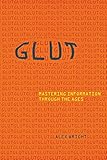
Alex Wright is opening up Defrag. He's an expert in the history of information and even wrote a book on it: Glut.
- Counting and money begat writing. Commerce was the birthplace or writing.
- People are pre-disposed to classify things hierarchicaly. We don't do well with "tag-cloud" style organization.
- Literacy is fairly recent, so oral traditions are important for how humans have managed information. For example, picture tapestries for teaching religion.
- The 19th century gave rise to the "literate culture." The growth of large "knowledge bureaucracies" in the 20th entury led to a schism of oral and written cultures.
- Oral cultures are additive (stories build on each other), aggretative, participaroty, and situational
- Literate cultures are subirdinative (individual authors assert ideas about the world), analytical, objective, and abstract.
- Facebook has a conversational, fluid, feel. But there is also a hierarchical aspect to it that allows for aggregation.
- The Web provides a place for oral and literate cultures to merge (clash?). Sites with lots of reviews are reflective of oral cultures. The aggregate of the reviews is more interesting than the individual comments generally. At the same time, individual views--especially from experts-- co-exist with these contributed reviews. Yet, they tend to remain separate.
- We're finding ways to encode our relationships. Ebay trust ratings are a shared acknowledgement of meaning that induce people to engage in trust relationships with people they don't know over long distances.
There is a lot of power in looking at the fundamental human impulses the drive us to engage in the online world is specific ways. By understanding thes deeper impulses to commicate orally and with symbols will guide us where we need to keep things apart and where we need to connect.




